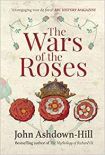The Wars of the Roses by John Ashdown-Hill
| The Wars of the Roses by John Ashdown-Hill | |
|
| |
| Category: History | |
| Reviewer: John Van der Kiste | |
| Summary: According to tradition, the Wars of the Roses began in 1455 and ended in 1485. Ashdown-Hill extends these boundaries backwards and forwards, and for those looking for a straightforward account of that tumultuous period, this will serve as well as any. | |
| Buy? Yes | Borrow? Yes |
| Pages: 336 | Date: May 2017 |
| Publisher: Amberley | |
| External links: Author's website | |
| ISBN: 978-1445660356 | |
|
| |
During my schooldays, I always found the Wars of the Roses the most fascinating period of English history. In those days we were taught that the battles began in 1455 and ended in 1485. Ashdown-Hill is one of several modern historians whose study of the subject extends these boundaries, and in this volume he starts with the reign of Richard II, ending late in the Elizabethan era.
Talking of school again, my history master more or less refused to teach us about the Wars, on the grounds that they were 'too confusing' for the brains of those aged between about nine and thirteen. It must be admitted that he had a point. The battles, we are reminded, were not fought between the princely families of Lancaster and York, but also between the Mortimers, Beauforts, Woodvilles and Tudors. Blame King Edward III, with his vast family from which the warring factions were descended. Blame nineteenth-century novelist Sir Walter Scott, who is credited with having been the man who probably coined the name Wars of the Roses. It was a phrase which nobody had ever heard of at the time or indeed for many years afterwards. Blame Shakespeare for giving us the story of the quarrelling nobles who invited their followers to pick roses in a London garden to show which side they were on.
The author takes us gently and clearly through the dynastic squabbles and battles, plus issues like the validity of Edward IV's probably bigamous marriage of Elizabeth Woodville. This set in train the trouble which led to the declaring of his children illegitimate, the assumption of the throne by the Duke of Gloucester as Richard III, and the end of the Yorkist dynasty, more or less, on a battlefield near Market Bosworth. As the man whose research led to the recent discovery of Richard's remains in Leicester, he is an ardent defender, maintaining that he was innocent of the death of Henry VI, who was not murdered but died of natural causes, and of Edward V, who was seriously ill and, like his younger brother Richard, may have been secretly disposed of by the ambitious Duke of Buckingham.
I have seen criticisms elsewhere of the author's books that he tends to place Richard III on a pedestal, too ready to absolve him of blame for all misdeeds laid at his door. Anyone who accepts the view of Richard as 'the black legend', to quote the sub-title of another recent biography by Desmond Seward, may wish to steer clear of this book. Anyone who agrees with his verdict that the Woodvilles were a grasping tribe led by 'a highly ambitious and power-hungry woman,' the one who had the good fortune to marry Edward IV, will surely enjoy.
As noted above, the saga does not end with the battle of Bosworth, or even the two pretenders, Lambert Simnel and Perkin Warbeck, who challenged Henry VII during the early years of his reign. Neither does it end with the execution of Margaret de la Pole, the daughter of the hapless George, Duke of Clarence, the man sentenced for treason and allegedly drowned in a barrel of wine. No, the last instalment is that of the man who saw himself as the legitimate Lancastrian heir come to reclaim his realm – Philip II of Spain and the Spanish Armada, in 1588.
This history is very readable, its three hundred or so pages providing an enjoyable and painless retelling. It may not dig deeply into detail, but there is no shortage of other works to cater for those who wish to know more. While it may be a little too indulgent towards Richard III, who is obviously one of the author's heroes, many books of this nature tend to lean one way or the other. Those which lean towards a completely neutral point of view are seemingly few and far between. For a moderately light account of the period, this will serve as well as any.
There is no shortage of associated titles for further reading. We can recommend the same author's The Last Days of Richard III, or for a life of his elder brother, Edward IV: Glorious Son of York by Jeffrey James covers not just the man but the age as well. Edward IV & Elizabeth Woodville: A True Romance by Amy Licence looks at the marriage which caused the Yorkist success story to unravel, while The Princes In The Tower by Alison Weir deals with British history's most famous mystery of 'the children who disappeared'. Margaret Pole: The Countess in the Tower by Susan Higginbotham is a life of the often-overlooked Yorkist princess whose misfortune it was to survive too long into the Tudor age.
We also have a review of Ashdown-Hill's The Private Life of Edward IV.
Please share on: ![]() Facebook,
Facebook, ![]() Twitter and
Twitter and
![]() Instagram
Instagram
![]() You can read more book reviews or buy The Wars of the Roses by John Ashdown-Hill at Amazon.co.uk Amazon currently charges £2.99 for standard delivery for orders under £20, over which delivery is free.
You can read more book reviews or buy The Wars of the Roses by John Ashdown-Hill at Amazon.co.uk Amazon currently charges £2.99 for standard delivery for orders under £20, over which delivery is free.
![]() You can read more book reviews or buy The Wars of the Roses by John Ashdown-Hill at Amazon.com.
You can read more book reviews or buy The Wars of the Roses by John Ashdown-Hill at Amazon.com.
Comments
Like to comment on this review?
Just send us an email and we'll put the best up on the site.


